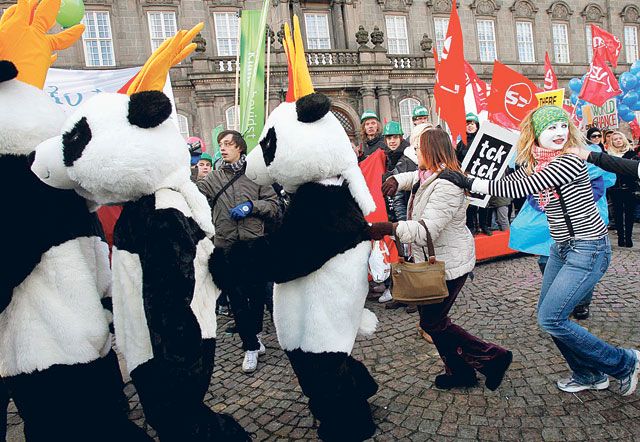Copenhagen: Industrial countries criticised a draft global warming pact Saturday for not making stronger demands on major developing countries as tens of thousands of banner-waving protesters demanding "climate justice" marched towards the UN conference.
Initial reaction to the negotiating text submitted on Friday underscored the split between the US-led wealthy countries and countries still struggling to overcome poverty and catch up with the modern world.
The tightly focused document was meant to lay out the crunch themes for environment ministers to wrestle with as they prepare for a summit of some 110 heads of state and government at the end of next week.
US delegate Jonathan Pershing said the draft failed to address the contentious issue of carbon emissions by emerging economies.
"The current draft didn't work in terms of where it is headed," Pershing said in the plenary, supported by the European Union, Japan and Norway.
Criticism
But the EU also directed criticism at the US, insisting it could make greater commitments to push the talks forward without stretching the legislation pending in Congress. Both the US and China should be legally bound to keep whatever promises they make, said Swedish Environment Minister Anders Carlgren.
Environment ministers started arriving in the Danish capital yesterday for informal talks before world leaders join the summit late next week.
On the chilly streets outside, police assigned extra squads to watch protesters marching towards the suburban conference centre to demand that leaders act now to fight climate change.
Police estimated their numbers at 25,000, while organisers said as many as 100,000 had joined the march from downtown Copenhagen, waving banners that read "Nature doesn't compromise" and "Climate Justice Now".
Danish supermodel Helena Christensen was in the crowd. "They will be very bad politicians if they do not hear us by now," she said about the policy-makers negotiating in Copenhagen.
The protest was peaceful but police said they had detained 19 people, mainly for breaking Denmark's strict laws against carrying pocket knives or wearing masks during demonstrations.
Environmental activists also rallied in Asia to increase the pressure on climate negotiators in Copenhagen.
Thousands marched in a "Walk Against Warming" in major cities across Australia and about 200 Filipino activists staged a festive rally in Manila to mark the Global Day of Action on climate change. Dozens of Indonesian environmental activists rallied in front of the US Embassy in Jakarta.
The draft distributed to the 192-nation conference set no firm figures on financing or on cutting greenhouse gas emissions.
It said all countries together should reduce emissions by a range of 50 per cent to 95 per cent by 2050, and rich countries should cut emissions by 25 to 40 per cent by 2020, in both cases using 1990 as the baseline year.
The draft continues the system for industrial countries set up in the 1997 Kyoto Protocol by which they are legally bound to targets for emission reductions and face penalties if they fall short. It makes no similar requirements of developing countries such as China and India, which have pledged to reduce the growth rate of emissions but reject the notion of turning those voluntary pledges into legal commitments.
So far, industrial nations' pledges to cut emissions have amounted to far less than the minimum.
The draft also left open the form of the agreement — whether it will be a legal document or a political declaration.
Emotional appeal
Ian Fry, the representative of the tiny Pacific island of Tuvalu, made an emotional appeal for the strongest format, one that would legally bind all nations to commitments to control carbon emissions.
"I woke up this morning crying, and that's not easy for a grown man to admit," Fry said, choking as he spoke in the plenary crowded with hundreds of delegates. "The fate of my country rests in your hands."
European Union leaders announced in Brussels this week after two days of tough talks that they would commit $3.6 billion (Dh13.22 billion) a year until 2012 to a short-term fund for poor countries.
Most of this money came from Britain, France and Germany.
Many cash-strapped former East bloc countries balked at donating but eventually all gave at least a token amount to preserve the 27-nation bloc's unity.
Still unknown is how much the wealthier nations, such as the US and Japan, will contribute.
Environment ministers started arriving in Copenhagen for the informal talks before world leaders join the summit late this week. However, the initial reaction to the negotiating text submitted on Friday underscored the split between the US-led wealthy countries and the less developed nations













